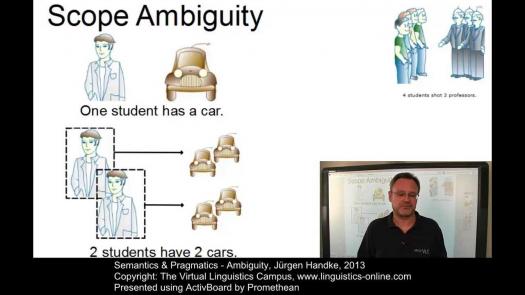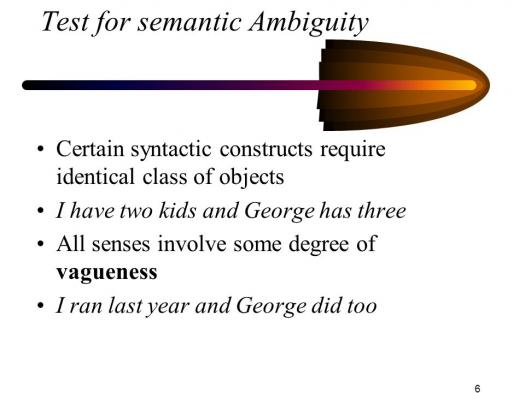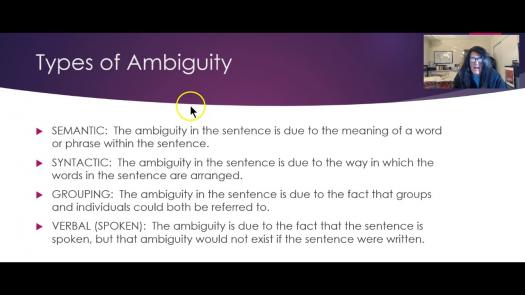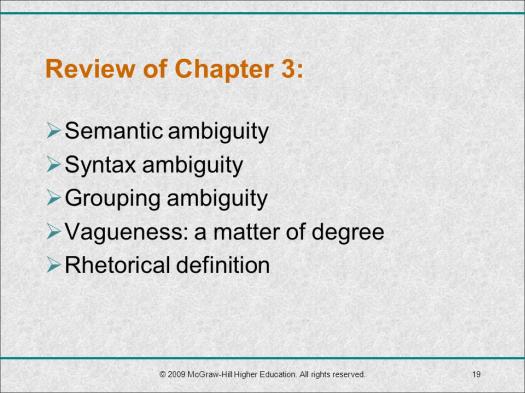What Do You Think You Know About Ambiguity And Vagueness In Semantics
-
Ambiguity is a term used to characterize phenomena that have more than only one?
-
Process
-
Form
-
Meaning
-
Use
-
Ambiguity and vagueness are terms that are used in cognitive semantics and they refer to the different instances of plurality of definitions. It seems fun yes? In that case, why not take a quiz and learn.
(185).webp)
Quiz Preview
- 2.
Lexical ambiguity is concerned with multiple interpretations of?
-
Forms
-
Types
-
Use
-
Lexemes
Correct Answer
A. LexemesExplanation
Lexical ambiguity refers to the situation where a word or phrase has multiple meanings or interpretations. In this context, lexemes are the correct answer because they are the basic units of meaning in a language, such as words or phrases. Lexical ambiguity occurs when these lexemes can be interpreted in different ways, leading to confusion or misunderstanding. Therefore, lexemes are directly related to the issue of multiple interpretations in lexical ambiguity.Rate this question:
-
- 3.
Ambiguity, polysemy, and vagueness are lexical examples that can be assigned to more than one?
-
Form
-
Use
-
Category
-
None of the above
Correct Answer
A. CategoryExplanation
The correct answer is "Category" because ambiguity, polysemy, and vagueness are all examples of lexical categories. These terms refer to different ways in which words can have multiple meanings or be unclear in their interpretation.Rate this question:
-
- 4.
The borders between the categories of ambiguity, polysemy, and vagueness are?
-
Distinct
-
Confusing
-
Fuzzy
-
None of the above
Correct Answer
A. FuzzyExplanation
The borders between the categories of ambiguity, polysemy, and vagueness are fuzzy. This means that it can be difficult to clearly define and distinguish between these categories. There is often overlap and ambiguity in determining whether a word or phrase falls into one category or another. The boundaries between these categories are not well-defined and can vary depending on context and interpretation.Rate this question:
-
- 5.
Structural ambiguity is a result or two or more different syntactic structures that can be attributed to one string of?
-
Words
-
Form
-
Type
-
Statement
Correct Answer
A. WordsExplanation
Structural ambiguity refers to the situation where a single string of words can have multiple interpretations or meanings due to different possible syntactic structures. In this context, the correct answer is "Words" because it accurately represents the nature of structural ambiguity, which is concerned with the multiple meanings that can arise from the arrangement and combination of words in a sentence.Rate this question:
-
- 6.
These three phenomena ‘form a gradient between total semantic identity’ and ‘total semantic distinctness’ according to?
-
Diane
-
Diana
-
Dean
-
Deane
Correct Answer
A. DeaneExplanation
The correct answer, Deane, suggests that the three phenomena mentioned in the question form a gradient between total semantic identity and total semantic distinctness. This implies that Deane is the most appropriate option among Diane, Diana, Dean, and Deane to represent this gradient.Rate this question:
-
- 7.
Transformational ambiguity is mentioned by Lyon who characterizes its prototypes as ‘ambiguous construction which depends upon the deeper connexions’, in the year?
-
1973
-
1974
-
1975
-
1970
Correct Answer
A. 1975Explanation
The correct answer is 1975. Transformational ambiguity, as mentioned by Lyon, refers to ambiguous constructions that rely on deeper connections.Rate this question:
-
- 8.
These meanings are distinct from each other and have no close?
-
Form
-
Use
-
Meaning
-
Schema
Correct Answer
A. SchemaExplanation
The word "schema" refers to a conceptual framework or a plan that outlines the structure or organization of something. It is distinct from the other options because "form" refers to the physical appearance or shape, "use" relates to the purpose or function, and "meaning" pertains to the significance or interpretation of something. Therefore, "schema" stands out as the correct answer as it represents a different concept altogether.Rate this question:
-
- 9.
A further type of ambiguity called scope ambiguity is discussed by Chierchia and McConnell-Ginet among others in the year?
-
1990
-
1991
-
1990
-
1993
Correct Answer
A. 1993Explanation
The question asks for the year in which Chierchia and McConnell-Ginet, among others, discussed a type of ambiguity called scope ambiguity. The correct answer is 1993.Rate this question:
-
- 10.
Another definition of vagueness is where ‘two or more meanings associated with a given phonological form are united as non-distinguished subcases of a single, more general meaning’, defined by?
-
Bob
-
Carroll
-
Shelby
-
Tuggy
Correct Answer
A. Tuggy -
Quiz Review Timeline (Updated): Jan 15, 2024 +
Our quizzes are rigorously reviewed, monitored and continuously updated by our expert board to maintain accuracy, relevance, and timeliness.
-
Current Version
-
Jan 15, 2024Quiz Edited by
ProProfs Editorial Team -
Feb 23, 2018Quiz Created by
Timmy198
Semantics Level Four/ Second Quiz Tuesday At 4:00
This quiz titled 'Semantics level four\/ Second Quiz Tuesday at 4:00' addresses complex topics in semantics, including types of ambiguity, relations of homophony, antonyms, and...
Questions:
10 |
Attempts:
174 |
Last updated:
Mar 19, 2023
|
Semantics Is Indeed A Wide Topic In English, What Do You Know About It?
Semantics unveils to you words which seems complicated in English, breaks them down into assimilable forms. Do you know semantics? Try out this short quiz.
Questions:
10 |
Attempts:
744 |
Last updated:
Mar 22, 2023
|
Semantics Is Indeed A Wide Topic In English, What Do You Know About It?
Semantics unveils to you words which seems complicated in English, breaks them down into assimilable forms. Do you know semantics? Try out this short quiz.
Questions:
10 |
Attempts:
744 |
Last updated:
Mar 22, 2023
|
Semantics Test
A short quiz to test your knowledge about lexical relation in semantics..
Questions:
5 |
Attempts:
6741 |
Last updated:
Mar 22, 2023
|
Semantic Roles Exercises Quiz With Answers
Discover how well you understand the intricate world of linguistics with our "Semantic Roles Quiz." This quiz is designed to challenge your knowledge...
Questions:
10 |
Attempts:
14739 |
Last updated:
Sep 21, 2024
|
Sense Trivia Quiz Chapter 7
The 'Sense Trivia Quiz Chapter 7' explores the nuances of language through questions about connotation, denotation, abstract words, and social communication in teams. It assesses...
Questions:
24 |
Attempts:
117 |
Last updated:
Mar 26, 2024
|
 Back to top
Back to top
















